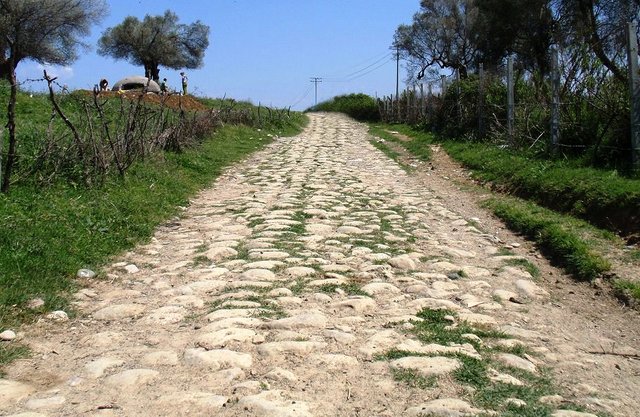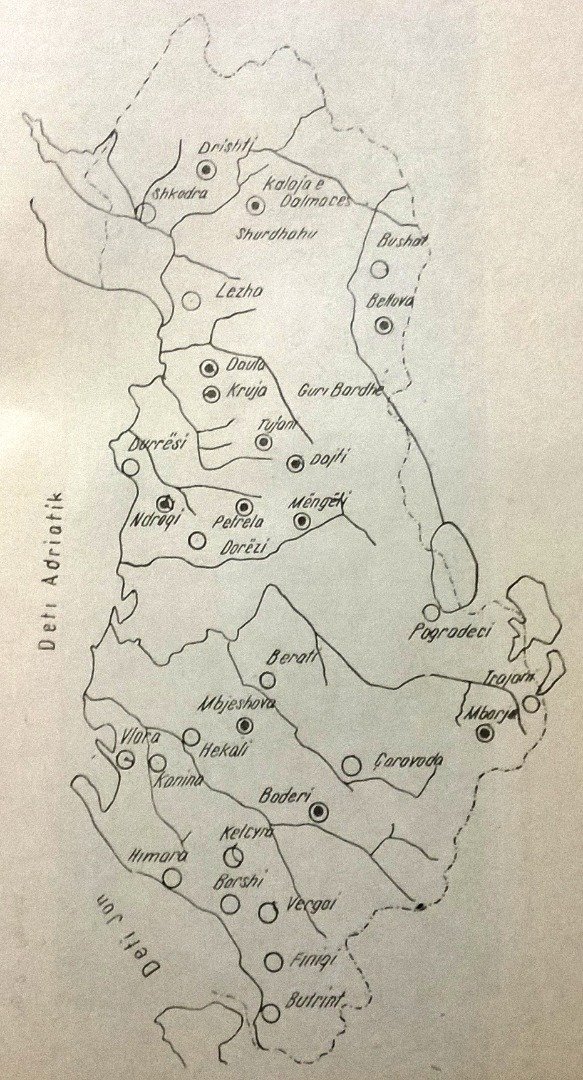After the Roman Empire conquered the Illyrian Kingdom and Epirus, they settled in Illyria and began to force their way across the entire Balkan peninsula as far as Asia Minor. Rome carried out an administrative policy in the Illyrian state that served its aim of having it Romanised. Southern Illyria was divided into four provinces: Preval (with Shkodër as its centre), Dardania (with Skopje as its center), Nova Epirus (with Dyrrhachium as its centre) and Ancient Epirus (with Nicopoja as its centre).
During the 1st century A.D, great changes took place in urban living. Some cities like Dyrrhachium, Shkodër, Bylis and Butrint were given the status of colonies. Their further development was related to the growth of handicrafts, trade and transport. An important military and troude route known as Via Egnatia joined Dyrrhachium and Apollonia and went past Thessaloniki to reach Constantinople. The road from Dyrrhachium (Durrës) to Byzantium (Istanbul) totaled 696 miles (1,120 km) and was built in the 1st century B.C. by the consul of Macedonia – G. Egnatius.

Via Egnatia
In late antiquity, when the power of the empire was decentralized to the provinces, many cities flourished. Dyrrhachium became one of the biggest cities of the late antiquity and the early Byzantine Empire. Documented visits of distinguished Roman and Byzantine personalities are abundant including the spokesman Asin Epikad, the jurist Prisk, and Emperors of the 3rd and 4th centuries A.D. - Claudius, Aurelian, Diocletian, Maxim Daza, Constantine, Constantine I, Justin and Justinian.
The Illyrians are referred to by that name as late as 601 A.D. in St. Demetris’ chronicle, while in 1079, the Byzantine chronicler Michael Ataliat writes about the Arbër population that inhabited the same territories were descendants of Illyrians.

Medieval Castles in Albania (in present-days)
Many historians, archaeologists and linguists share the same view that the Arbërs are direct successors of the Illyrians. Despite the lack of historic records from the 7th to 10th centuries A.D, there is little doubt or other theories about their origin.
Linguistic studies have not only anticipated such theories, but have also rendered a valuable contribution to the Illyrian-Albanian continuity, which is supported by the simple fact that the Albanian language is spoken today in the same region where the Illyrian language was once spoken. A great deal of archaeological evidence as well as other evidence from the tangible and intangible culture testifies that there is an incessant cultural continuity from Illyrians to early Albanians. Valuable discoveries of the earliest Albanian medieval culture in Koman, show this development began during the late antiquity and prospered during the 7th to 11th centuries all over the territory of present-day Albania.
Source: http://www.albca.com/aclis/modules.php?name=News&file=print&sid=298
Source: www.seda.org.al/download/i/mark_dl/u/4012653116/4611166515/1.0-history.pdf
Not citing sources of copied works is plagiarism and frowned upon by the community.
Sharing content and add value by:
Repeated plagiarized posts are considered spam. Spam is discouraged by the community, and may result in action from the cheetah bot.
Creative Commons: If you are posting content under a Creative Commons license, please attribute and link according to the specific license. If you are posting content under CC0 or Public Domain please consider noting that at the end of your post.
Not indicating that the content you copy/paste is not your original work could be seen as plagiarism.
If you are actually the original author, please do reply to let us know!
Thank You!
Downvoting a post can decrease pending rewards and make it less visible. Common reasons:
Submit
I am the original author. Please delete all comments you write at this post, also at the other my posts.
Thank You!
Downvoting a post can decrease pending rewards and make it less visible. Common reasons:
Submit
thank you
Downvoting a post can decrease pending rewards and make it less visible. Common reasons:
Submit
We wuz greeks! will you carry this on up to the ottoman empire and modern era?
Downvoting a post can decrease pending rewards and make it less visible. Common reasons:
Submit